PHOTO
NEW YORK - The dollar rose against a basket of major currencies on Tuesday after three straight sessions of declines ahead of a U.S. Federal Reserve policy statement, while concerns over the possibility of another Russian gas supply cut weighed on the euro.
European Union countries approved a weakened emergency plan to curb their gas demand on Tuesday, after striking compromise deals to limit the cuts for some countries, as they brace for further Russian reductions in supply.
Risk-off sentiment helped boost the dollar, as U.S. equities were pulled lower following a profit warning from retail giant WalMart, which said it would slash prices to reduce inventory.
The Fed is widely expected to raise interest rates by 75 basis points on Wednesday, with investors keeping a close eye on the central banks' forward guidance as it grapples with high inflation and the potential for a recession.
"The key factors driving currencies haven’t changed any – it is gas problems in Europe, it is the difference between the Fed and the ECB and the BOJ in terms of who is the more hawkish in terms of their reaction function," said Huw Roberts, head of analytics at Quant Insight.
"The margin compression story on WalMart from higher inflation, you have to think that can be extrapolated across a number of other names in the retail space and other industries in the broader economy so it is only going to keep people worried about recession."
The dollar index was up 0.564% at 107.010, with the euro down 0.81% to $1.0137.
Data showed U.S. consumer confidence fell for a third straight month in July, indicating slower growth to start the third quarter. On Thursday, investors will get the advance reading for second-quarter gross domestic product, while Friday will bring the release of personal consumption expenditures, the Fed's preferred inflation measure.
A second straight quarter of negative growth would result in what is known as a technical recession by analysts, although an official declaration of a recession from the National Bureau of Economic Research, which uses a more comprehensive definition, would likely come much later.
On Monday, Russian energy giant Gazprom, citing instructions from an industry watchdog, said gas flows to Germany through the Nord Stream 1 pipeline would fall to 33 million cubic metres per day from Wednesday, or half of the current flow, which was already at only 40% capacity. [
The euro also fell 0.9% against the safe-havens yen to 138.400 and was down 1.04% against the Swiss franc at 0.975.
The Japanese yen strengthened 0.12% versus the greenback to 136.52 per dollar, while sterling was last trading at $1.203, down 0.10% on the day.
In cryptocurrencies, bitcoin was last down 5.75% to $20,893.93.
(Reporting by Chuck Mikolajczak, Editing by Mark Potter)





















